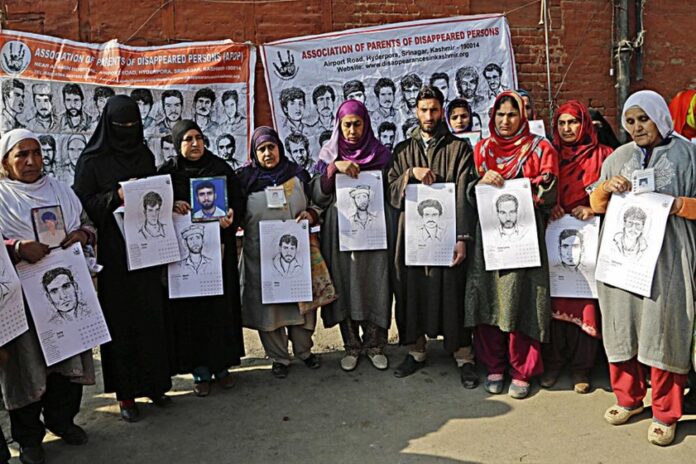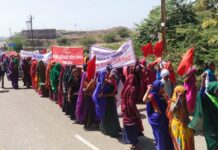
According to human rights activists, more than 8,000 persons have gone missing in Kashmir since 1989. Over the past three decades or more of turmoil in Kashmir, thousands of civilians have gone missing in the custody of security forces. Although the bodies of some were found, most remain untraced.
Both India and Pakistan claim ownership of the Kashmir area, which has contributed to the escalation of tensions between the two countries in this region over the course of the last few decades. The situation has been characterized by violence and violations of human rights, including extrajudicial executions, which have been a recurrent occurrence in the area. These killings have been carried out without following legal procedures. When persons are murdered by members of the government or other organizations, there has been no recourse to the judicial system or a trial.
A young guy from the Kashmir area named Abdul Rasheed was recently kidnapped and murdered by the Indian occupation force. The murdering of people without due process of law is becoming more common in that area, and his story is only one illustration of that trend. It has been reported that Rasheed was arrested by the Indian army on suspicion that he was a member of a militant group; however, Rasheed’s family maintains that he is innocent and has no ties to any militant organizations. The Indian army has a long history of kidnapping and murdering innocent Kashmiri people, most of the time on the pretense that they were involved in terrorist activity.
The government of Kashmir and the human rights activists in the region have both reacted with shock and condemnation to the situation. Mehbooba Mufti, who had previously served as the Chief Minister of Jammu and Kashmir, said in a tweet that “The murder of Abdul Rasheed is just another example of the cruelty that the Indian occupation has brought. After 2019, these kinds of occurrences have become routine since no one is held accountable for their occurrence. Probes & investigations fail to nail criminals & achieve justice.”
In Kashmir, the problem of murders that do not follow established legal procedures is not new and has been a big concern for many years. From the beginning of the war, there have been thousands of extrajudicial executions in the area, according to the reports of groups that advocate for human rights. It has been said that the Indian military targets innocent young men and women, frequently falsely accusing them of involvement in terrorist activities, and then killing them in simulated gun battles.
These random executions have had a devasting effect on the community, with families being left to mourn the death of their loved ones and with no avenue for justice being available to them. A culture of dread and distrust has developed in the area as a result of the worry that people have about being targeted by the Indian army.
Read also: Kashmir: Son Killed in ‘Gunfight’, Father Booked Under UAPA for Demanding Son’s Body
The absence of accountability and justice in Kashmir is one of the most significant problems caused by extrajudicial executions in that region. In many instances, the individuals responsible for the murders are not subjected to appropriate investigations or prosecutions, and they are thus permitted to continue their crimes without fear of repercussions. Because of this, members of the security forces now have the impression that they are above the law, which has only resulted in more breaches of human rights in the area.
The government of India has come under fire for several reasons, including the fact that it has failed to address the problem of extrajudicial executions and has failed to deliver justice to the victims and the families of those killed. As a result of a lack of political will to address the problem, more violations of human rights have been committed in the area.
The problem of extrajudicial executions in Kashmir has not gone ignored by the world community, as shown by the fact that the Indian army’s acts have been condemned by a large number of human rights groups as well as the United Nations. The United Nations has requested that an inquiry be conducted on the state of human rights in the area, and they have asked India to take action to remedy the problem.
The international community has brought attention to the fact that there is a pressing need for more pressure to be applied to India to resolve violations of human rights in Kashmir. The topic has been brought up in several international venues, and India is coming under increasing amounts of pressure to take action to address the problem of extrajudicial murders and other violations of human rights in the area. The purpose of the demonstration held at the United Nations Headquarters in Geneva was to bring attention to the violations of human rights that are taking place in India. It included a variety of diverse activities, such as standees, 4D view tents, posters, and banners, all of which were aimed to emphasize the concerns of minority rights and women’s rights in India. These topics were brought to light through the event.
The problem of extrajudicial executions in Kashmir is a major violation of human rights that requires immediate attention and action. This is a situation that must be addressed as soon as possible. More violations of human rights have occurred as a direct result of the absence of responsibility and justice for the victims and their families.
Muhammad Wasama Khalid is a Correspondent and Researcher at Global Affairs. He is pursuing a Bachelor’s degree in International Relations at National Defense University. His interests include history, politics, and current affairs. He has been published in the London Institute of Peace and Research, South Asian Journal, Diplomatic Insight, International Policy Digest, Sri Lanka Guardian, Global Village Space, Global Defense Insight, Global Affairs, And Modern Diplomacy. He tweets at @Wasama Khalid and can be reached at [email protected]




























